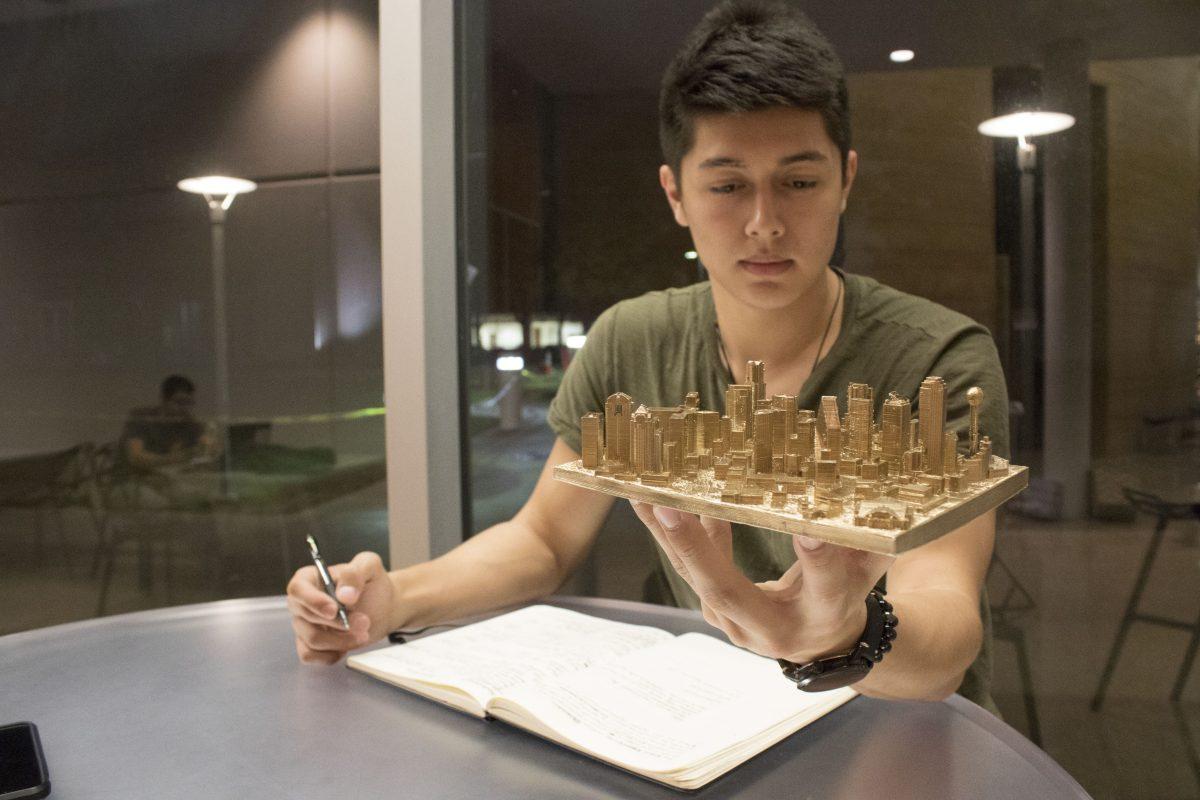A UTD student co-launched a 3-D printed landscape product in an effort to foster city pride.
Gabe Villani, an information technology and systems junior, is one of two founders of Metro Block, which began operating in November. The Metro Block is a miniature skyline, designed to represent the essence of Dallas.
“Dallas is a very business-oriented city,” Villani said. “We wanted to encapsulate that in the product. It’s also a great conversation piece.”
Villani and his business partner, Demont Campbell, met at a photoshoot for one of Campbell’s other projects.
“(We) were just talking and he was telling me about his other businesses,” Campbell said. “We kind of just clicked from there.”
The concept for Metro Block came about when Villani and Campbell were discussing ideas for how to enter the 3-D printing market.
“It’s kind of like a portfolio starter, essentially,” Villani said. “There are other business solutions that we can do through 3-D printing. It’s limitless. You can print almost anything as long as you can design it.”
Campbell, who graduated from Texas Tech University in 2015 with a degree in architecture, designs the models by using Google Maps and an architecture software program. After he selects important buildings to include in the model, he uses the square footage of each building to organize it into miniature cityscape. The Metro Block, which retails for $50, is then 3-D-printed using PLA, a hard plastic similar to the material found in Legos. The printing process takes 12 hours to complete, as the model is constructed layer by layer.
Villani said the most challenging aspect of managing the business was juggling multiple responsibilities.
“I’m doing a lot of other projects as well,” he said. “It was just a challenge to keep it in place and make sure I devoted enough time to it.”
The reception to the product has been positive thus far, Villani said.
“I’ve walked around (Dallas) with just the model in my hand,” he said. “I’ve had the owner of a store come up to me and say, ‘Hey, what is that?’ They were really interested in it. Everyone thinks it’s a really cool product.”
Campbell and Villani divide responsibilities and oversee different areas of the brand’s growth. Villani said he plans to expand Metro Block’s reach from a physical product to a concept called Metro Block Adventures.
“We go and we explore a block, we explore different cool places in Dallas,” Villani said. “Cool places to study, cool places to eat, places just to get to know your city a little bit more. We see this becoming a lifestyle brand built around cities and what the city encapsulates.”
Campbell said he sees Metro Block as a platform to discuss social issues affecting individual cities. To accomplish this, Campbell and Villani launched a blog to accompany the brand’s storefront website. Campbell’s most recent blog post tackled the homelessness issue in downtown Dallas.
“The idea is that people who don’t hear about that stuff just reading on Facebook or Twitter would be able to get the awareness about those issues going on in individual cities,” he said. “Later on, when we launch other Metro Blocks, we’ll also bring on the issues and things that are going on in those cities.”
Although the Metro Block has only been designed for Dallas at the moment, Villani and Campbell said they are considering expanding to include cities such as Chicago and Houston, based on customer feedback.
“There are certain places that have a very nationalistic tendency towards their city,” Villani said. “(Metro Block) gives people a way to put that in a product — having pride in where you come from.”











